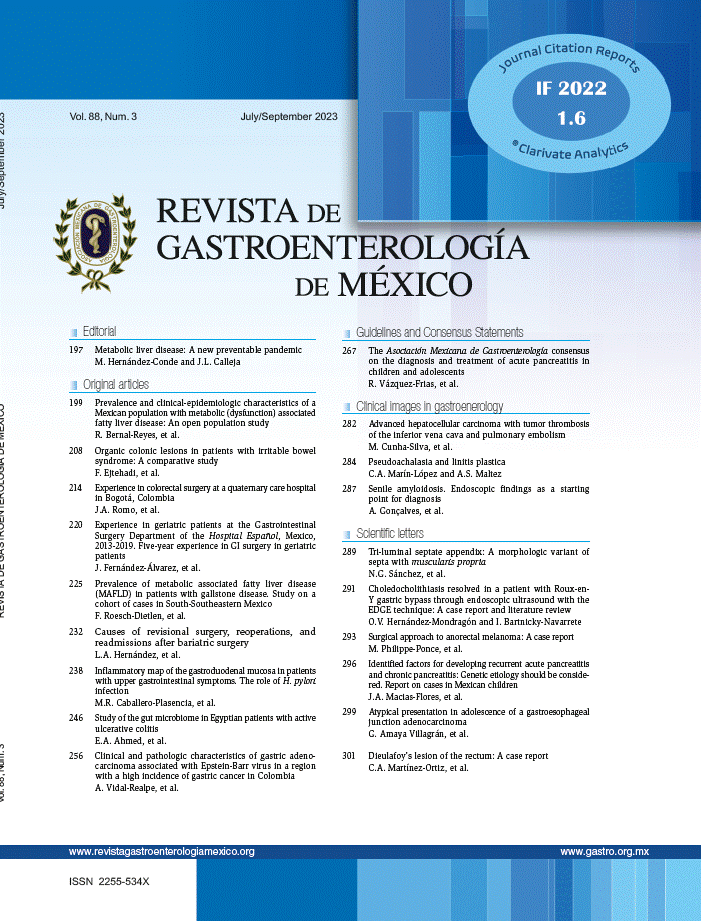The study by Nelissen et al.1 that appears in this issue of the Revista de Gastroenterología de México was conducted on 483 adolescents between 12 and 18 years of age, from Buenos Aires, Argentina. Prevalence in that group of teenagers for presenting with a functional gastrointestinal disorder (FGID), in accordance with the Rome III criteria, was 17.0%. Prior to the publication of that study, the Functional International Digestive Epidemiological Research Survey Group (FINDERS) of the Sociedad Latinoamericana de Gastroenterología, Hepatología y Nutrición Pediátrica (SLAGHNP) had reported said prevalence in schoolchildren and adolescents from different Latin American regions that included Mexico2 in the north, Panama, El Salvador, and Nicaragua3–5 in the central zone, and Colombia and Ecuador6–8 in the “northern cone” of South America, at between 13.4-29.0%.9 These data show the variability in prevalence that is dependent on the region where the studies are conducted, as well as the need to continue carrying out national studies on FGIDs. That effort will provide local data on the epidemiology and pathogenesis of each area, enabling the provision of healthcare and the planning of local public health strategies.
In order of frequency, Nelissen et al.1 described abdominal migraine, irritable bowel syndrome, functional constipation, and aerophagia as the main causes of the FGIDs in their study population. Those data differed somewhat from the main causes reported in other Latin American countries, which, in order of frequency, were functional constipation, irritable bowel syndrome, functional abdominal pain, and to a lesser degree, vomiting and aoerophagia.2–8 Those studies support the possible explanation for the variation in those results that involves genetic, nutritional, environmental, psychosocial, cultural, socioeconomic, and infectious concepts typical of each region.
Among the possible associations for presenting with a FGID in the Argentinian adolescents analyzed by Nelissen et al.1 were female sex and attending a private school. Those data are consistent, in relation to sex, with the results reported by Saps et al. in two Colombian studies,6,7 and with the results reported by Zablah et al.4 in El Salvador, regarding the type of school. Other possible associations reported in Latin American children were age, parents that are separated/divorced, and the presence of nausea.5,7 Those results are in line with the bio-psycho-social model of FGIDs, which proposes that sociodemographic and psychologic factors play a role in the pathogenesis of those FGIDs.
The above results demonstrate that speaking the same language and having a Latin American heritage is not sufficient for advancing our knowledge and understanding of the influence of the different factors involved in the pathophysiology and pathogenesis of FGIDs.
Finally, with the appearance of the new Rome IV criteria10 in May 2016, prevalence and the main causes of FGIDs in the studies conducted on schoolchildren and adolescents in the United States11 and Colombia12 are aspects that are beginning to be controversial. Therefore, future studies are needed to better understand the reasons for the possible regional differences and advocate for multiculturalism and multinational research to better define the epidemiology, symptoms, comorbidity, and quality of life related to the health of children with FGIDs.
Ethical disclosuresProtection of human and animal subjectsThe authors declare that no experiments were performed on humans or animals for this study.
Confidentiality of dataThe authors declare that they have followed the protocols of their work center on the publication of patient data.
Right to privacy and informed consentThe authors declare that no patient data appear in this article.
Financial disclosureNo financial support was received in relation to this article.
Conflict of interestThe author declares that there is no conflict of interest.
Please cite this article as: Velasco-Benítez CA. Trastornos gastrointestinales funcionales en adolescentes latinoamericanos: desde la Argentina hasta México. Revista de Gastroenterología de México. 2018;83:365–366.
See related content at DOI: https:// 10.1016/j.rgmxen.2018.09.001, Nelissen LG, Koppen IJN, Follett FR, Boggio-Marzet C, Saps M, Garzon K, Benninga MA. Prevalence of functional gastrointestinal disorders among adolescents in Buenos Aires, Argentina. Rev Gastroenterol Méx. 2018;83:367–74.



